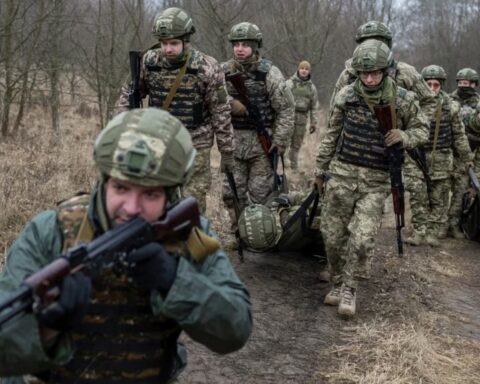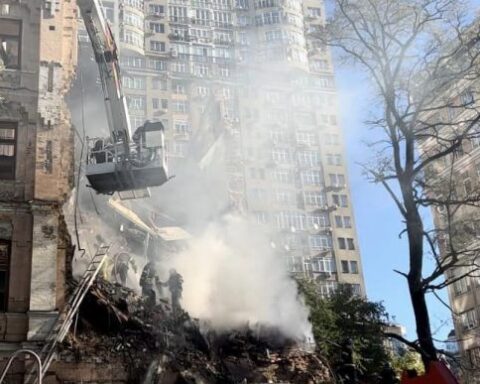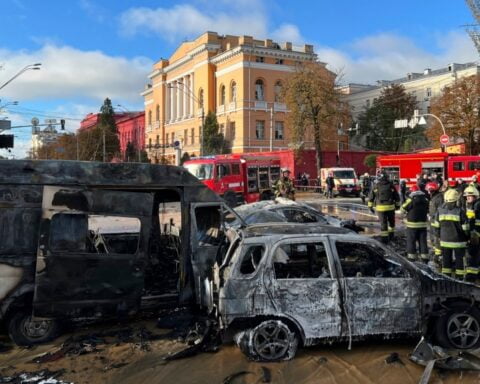Russia has been “reinforcing defenses” in southern Ukraine while keeping up attacks on Ukrainian positions in the eastern Donetsk region but has only managed to advance about 10 kilometers in the past month on its “most successful axis” there, according to U.K. military intelligence.
In its latest regular assessment, on August 9, British Defense Intelligence said Russian forces had not advanced more than three kilometers elsewhere in Donetsk, one of the two eastern regions where Russia-backed separatists have held large swaths of territory for the past eight years.
Such a pace is “almost certainly significantly less than planned,” the intelligence added.
“Despite its continued heavy use of artillery in these areas, Russia has not been able to generate capable combat infantry in sufficient numbers to secure more substantial advances,” it said.
British intelligence previously warned on August 8 that Russia was using anti-personnel mines in an effort to defend and hold its defense lines, with resulting risks to both the military and local civilian populations.
The Ukrainian Army’s General Staff said early on August 9 that a Russian offensive is continuing toward the hub cities of Bakhmut and Avdiyivka in the eastern Donetsk region as the enemy tries to inflict “maximum losses” on Ukrainian forces.
It said the Russian Air Force was bombarding military facilities in the direction of Donetsk in support of artillery and other ground operations aimed at dislodging Ukrainian units from the front lines.
Battlefield reports from either side in the rapidly developing conflict are difficult to confirm.
But Kyiv’s military planners said their forces had repelled reconnaissance and offensive operations in a handful of settlements around Ivano-Daryivka, Bakhmut, and Zaitseve.
They said Russian forces had withdrawn after unsuccessful pushes around Avdiyivka and Krasnohorivka.
WATCH: German-Built Howitzers Pound Russian Targets In Ukraine
Kyiv said two Russian warships armed with Kalibr cruise missiles are poised for battle off Ukraine’s Black Sea coast.
Meanwhile, international concern persisted over the weekend shelling of the Zaporizhzhya nuclear power plant over potential for disaster at Europe’s largest atomic facility.
The head of the Ukrainian nuclear power company Enerhoatom has urged that Zaporizhzhya be declared a military-free zone to avoid nuclear catastrophe.
Zaporizhzhya was seized early in the five-month-old invasion but continues to be manned by Ukrainian staff.
UN Secretary-General Antonio Guterres warned that “any attack to a nuclear plant is a suicidal thing” in calling on August 8 for international inspectors to be given access to Zaporizhzhya.
The Russian-installed head of the local administration was quoted by Interfax as saying on August 8 that the facility was operating “in normal mode.”
Washington and the World Bank announced more support for Ukraine on the heels of U.S. President Joe Biden’s committing this week to the single largest package of security assistance under his so-called drawdown authority with $1 billion in aid that includes long-range weapons and medical transport vehicles.
The U.S. Agency for International Development (USAID) said on August 8 that Washington would provide $4.5 billion more in economic funding, nearly doubling the budgetary support so far since Russia’s invasion began in February.
The World Bank said it will implement the U.S. grant, which it said is aimed at urgent needs including health-care, pensions, and social payments.
Also, Reuters cited a document in which Russia, Ukraine, Turkey, and the United Nations pledged to ensure a 10-nautical-mile buffer zone for ships exporting Ukrainian grain through the Black Sea.
The long-awaited procedures are part of intense international efforts to unblock millions of tons of grain stuck at Ukrainian ports since the invasion began.






